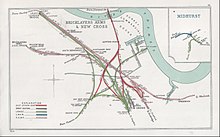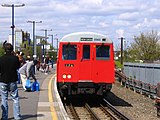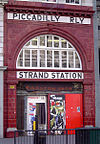New Cross railway station
| New Cross | |
|---|---|
 Entrance to New Cross station | |
| Location | New Cross |
| Local authority | London Borough of Lewisham |
| Managed by | Southeastern |
| Owner | Network Rail |
| Station code(s) | NWX |
| DfT category | C2 |
| Number of platforms | 4 |
| Accessible | Yes[1] |
| Fare zone | 2 |
| OSI | New Cross Gate |
| National Rail annual entry and exit | |
| 2019–20 | |
| – interchange | |
| 2020–21 | |
| – interchange | |
| 2021–22 | |
| – interchange | |
| 2022–23 | |
| – interchange | |
| 2023–24 | |
| – interchange | |
| Key dates | |
| October 1850 | Opened |
| October 1850 | East London Line opened |
| 22 December 2007 | London Underground services discontinued |
| 27 April 2010 | East London line reopened |
| Other information | |
| External links | |
| Coordinates | 51°28′36″N 0°01′58″W / 51.4766°N 0.0327°W |
New Cross is an interchange station between the Windrush line of the London Overground and National Rail services operated by Southeastern, located in New Cross in south-east London. It is 4 miles 68 chains (7.8 km) down the line from London Charing Cross and is in London fare zone 2. It is a southern terminus of some Windrush line services from Dalston Junction.
There is an out-of-station interchange with New Cross Gate station, also situated on the Windrush line of the London Overground, located 620 metres (2,030 ft) walk away. To avoid confusion with those at New Cross Gate, the platforms at New Cross are lettered rather than numbered. Ticket barriers control access to all platforms.
History

London Overground | |||||||||||||||||||||||||||||||||||||||||||||||||||||||||||||||||||||||||||||||||||||||||||||||||||||||||||||||||||||||||||||||||||||||||||||||||||||||||||||||||||||||||||||||||||||||||||||||||||||||||||||||||||||||||||||||||||||||||||||||||||||||||||||||||||||||||||||||||||||||||||||||||||||||||||||||||||||||||||
|---|---|---|---|---|---|---|---|---|---|---|---|---|---|---|---|---|---|---|---|---|---|---|---|---|---|---|---|---|---|---|---|---|---|---|---|---|---|---|---|---|---|---|---|---|---|---|---|---|---|---|---|---|---|---|---|---|---|---|---|---|---|---|---|---|---|---|---|---|---|---|---|---|---|---|---|---|---|---|---|---|---|---|---|---|---|---|---|---|---|---|---|---|---|---|---|---|---|---|---|---|---|---|---|---|---|---|---|---|---|---|---|---|---|---|---|---|---|---|---|---|---|---|---|---|---|---|---|---|---|---|---|---|---|---|---|---|---|---|---|---|---|---|---|---|---|---|---|---|---|---|---|---|---|---|---|---|---|---|---|---|---|---|---|---|---|---|---|---|---|---|---|---|---|---|---|---|---|---|---|---|---|---|---|---|---|---|---|---|---|---|---|---|---|---|---|---|---|---|---|---|---|---|---|---|---|---|---|---|---|---|---|---|---|---|---|---|---|---|---|---|---|---|---|---|---|---|---|---|---|---|---|---|---|---|---|---|---|---|---|---|---|---|---|---|---|---|---|---|---|---|---|---|---|---|---|---|---|---|---|---|---|---|---|---|---|---|---|---|---|---|---|---|---|---|---|---|---|---|---|---|---|---|---|---|---|---|---|---|---|---|---|---|---|---|---|---|---|---|---|---|---|---|---|---|---|---|---|---|---|---|---|---|---|---|---|
| |||||||||||||||||||||||||||||||||||||||||||||||||||||||||||||||||||||||||||||||||||||||||||||||||||||||||||||||||||||||||||||||||||||||||||||||||||||||||||||||||||||||||||||||||||||||||||||||||||||||||||||||||||||||||||||||||||||||||||||||||||||||||||||||||||||||||||||||||||||||||||||||||||||||||||||||||||||||||||
Legend | |||||||||||||||||||||||||||||||||||||||||||||||||||||||||||||||||||||||||||||||||||||||||||||||||||||||||||||||||||||||||||||||||||||||||||||||||||||||||||||||||||||||||||||||||||||||||||||||||||||||||||||||||||||||||||||||||||||||||||||||||||||||||||||||||||||||||||||||||||||||||||||||||||||||||||||||||||||||||||
| |||||||||||||||||||||||||||||||||||||||||||||||||||||||||||||||||||||||||||||||||||||||||||||||||||||||||||||||||||||||||||||||||||||||||||||||||||||||||||||||||||||||||||||||||||||||||||||||||||||||||||||||||||||||||||||||||||||||||||||||||||||||||||||||||||||||||||||||||||||||||||||||||||||||||||||||||||||||||||
In the early Victorian railway boom two companies constructed lines through the area. The London and Croydon Railway (L&CR) built a station on the New Cross Road close to Hatcham in 1839.
On 14 October 1844 a large fire that broke out in a paint shop destroyed carriage and engine sheds and workshops adjacent to the station. The fire was witnessed by Louis Philippe I, King of France who was travelling from the station to Dover.[4]
On 30 July 1849 the South Eastern Railway (SER) opened a station at North Kent Junction when the North Kent line opened linking Strood with the London and Greenwich Railway route to London Bridge.[5][6] This station proved inconvenient so a new station called New Cross & Naval School[5] was opened by the SER in October 1850 located adjacent to the New Cross Road in the heart of New Cross. In 1854 the station was renamed New Cross. Accordingly, both the South Eastern Railway (SER) and the London Brighton & South Coast Railway had stations named New Cross which caused confusion until the two companies were absorbed under the 1923 grouping into the Southern Railway and the name of the older station was changed to New Cross Gate; the ex-South Eastern station remained New Cross.
On 7 December 1869 the East London Line opened serving the LBSCR New Cross station but it was not until 1 April 1880 that services (which started at Addiscombe and worked through to Liverpool Street) started operation via New Cross SER. Freight trains also operated via the East London Line and were hauled by Great Eastern Railway locomotives through to Hither Green Goods Yards. From 30 June 1911 East London Line passenger services south of New Cross ceased.
On 31 March 1913 electric passenger services operated by the Metropolitan Railway started operation from New Cross and worked through to Kensington Addison Road via Kings Cross.[7]
After World War II and following nationalisation on 1 January 1948, the station was part of British Railways Southern Region.
The East London Line was closed to goods traffic in 1962.
In the 1950s and 1960s, London Underground planned a new line connecting north-west and south-east London. Approval for the first stage of the Fleet line (renamed the Jubilee line in 1975) to Charing Cross was granted in 1969,[8] with second and third stages approved in 1971 and 1972.[9] New Cross station was to be the penultimate station of phase 3 running to Lewisham. Southbound trains were to serve one of the existing platforms and northbound trains would have served a new platform in tunnel beneath the station.[9] Although phases 2 and 3 were not carried out due to a lack of funds, a 200-yard (180 m) section of the northbound tunnel was constructed near New Cross in 1972 to test new tunnelling techniques.[10]
The station was rebuilt in the 1970s and the original station buildings on the road bridge were replaced in 1975 by a wooden building which opened in Amersham Vale. Platforms on the down and up fast lines were closed and demolished and a new track layout was introduced at this time in connection with the wider London Bridge re-signaling scheme.[11]
In 1985, the present buildings in Amersham Vale opened.[12]
Until 22 December 2007 London Underground used to serve this station as the southern terminus to their East London line. This closed for major engineering work to convert the East London line to standard 750 V third rail electrification. The line reopened on 27 April 2010 with services now operated by London Overground using Class 378 Capitalstar units.
Carriage Shed
A 6 siding carriage shed was located just north of the station. Built by the East London Railway the shed was leased by the Metropolitan Railway and continued in service until the line closed in 2007. When the line re-opened the new Capitalstar units were maintained at a new depot at New Cross Gate.[13]
Services
New Cross is a southern terminus of the Windrush line of the London Overground, with services operated using Class 378 EMUs. Additional services at the station are operated by Southeastern using Class 376, 465, 466 and 707 EMUs.
The typical off-peak service in trains per hour is:[14][15]
- 6 tph to London Cannon Street
- 2 tph to Orpington via Grove Park
- 2 tph to Dartford via Woolwich Arsenal
- 2 tph to Slade Green via Bexleyheath, continuing to London Cannon Street via Woolwich Arsenal and Greenwich
- 4 tph to Dalston Junction via Surrey Quays (Windrush line)
Additional services, including trains to and from London Cannon Street via Sidcup call at the station during the peak hours.
| Preceding station | Following station | |||
|---|---|---|---|---|
| Southeastern | ||||
| Southeastern | ||||
| Southeastern | ||||
| Southeastern Peak Hours Only | ||||
| Preceding station | Following station | |||
| Surrey Quays towards Dalston Junction |
Windrush line | Terminus | ||
| Former services | ||||
| Preceding station | Following station | |||
| Surrey Docks towards Hammersmith |
Metropolitan line
|
Terminus | ||
| Surrey Quays towards Shoreditch |
East London line (1940-2007) |
|||
| Abandoned plans | ||||
| Preceding station | Following station | |||
| Surrey Docks towards Stanmore |
Jubilee line Phase 3 (never constructed) |
Lewisham Terminus | ||
Gallery
- A60/62 Stock train terminating at New Cross in 2006 before the line was temporarily closed to incorporate the line into the LO Network.
Connections
London Buses routes 53, 177, 225, 453 and night routes N53 and N89 serve the station.[16][17]
Accidents
- The Spa Road Junction rail crash occurred outside the station on 8 January 1999.
- On 10 January 2022, a passenger train ran into the buffer stop at New Cross.[18]
References
- ^ "Step free Tube Guide" (PDF). Transport for London. April 2021. Archived (PDF) from the original on 15 May 2021.
- ^ "Out of Station Interchanges" (XLSX). Transport for London. 16 June 2020. Retrieved 5 November 2020.
- ^ a b c d e f g h i j "Estimates of station usage". Rail statistics. Office of Rail Regulation. Please note: Some methodology may vary year on year.
- ^ "Destructive Fire at New Cross Railway Station". Illustrated London News. 19 October 1844. p. 253. Retrieved 20 March 2019.
- ^ a b Chronology of London Railways by H.V.Borley
- ^ Londons Disused Stations Volume 4 by J.E.Connor
- ^ Mitchell, Vic; Smith, Keith (1996). East London Line. Midhurst, UK: Middleton Press. p. 5. ISBN 1-873793-80-4.
- ^ Horne, Mike (2000). The Jubilee Line. Capital Transport. pp. 28–34. ISBN 1-85414-220-8.
- ^ a b Horne, Mike (2000). The Jubilee Line. Capital Transport. p. 36. ISBN 1-85414-220-8.
- ^ Horne, Mike (2000). The Jubilee Line. Capital Transport. p. 37. ISBN 1-85414-220-8.
- ^ Mitchell, Vic; Smith, Keith (1996). East London Line. Midhurst, UK: Middleton Press. p. 60. ISBN 1-873793-80-4.
- ^ Mitchell, Vic; Smith, Keith (1996). East London Line. Midhurst, UK: Middleton Press. p. 64. ISBN 1-873793-80-4.
- ^ Mitchell, Vic; Smith, Keith (1996). East London Line. Midhurst, UK: Middleton Press. p. 65. ISBN 1-873793-80-4.
- ^ Table 199, 200, 203, 204 National Rail timetable, June 2024
- ^ "London Overground Timetable: Highbury & Islington to New Cross, Clapham Junction, Crystal Palace and West Croydon" (PDF). Transport for London. Retrieved 12 June 2024.
- ^ "Buses from New Cross" (PDF). TfL. 4 February 2023. Retrieved 5 February 2023.
- ^ "Night buses from New Cross" (PDF). TfL. June 2022. Retrieved 5 February 2023.
- ^ "Buffer stop collision at Enfield Town station 12 October 2021" (PDF). Para 105: Rail Accidents Investigation Branch. Retrieved 6 July 2022.
{{cite web}}: CS1 maint: location (link)
External links
- Train times and station information for New Cross railway station from National Rail




